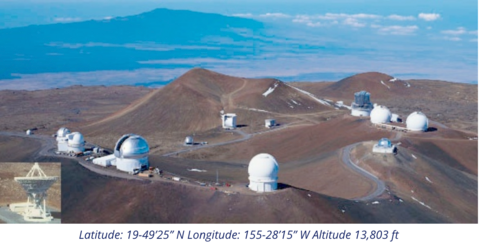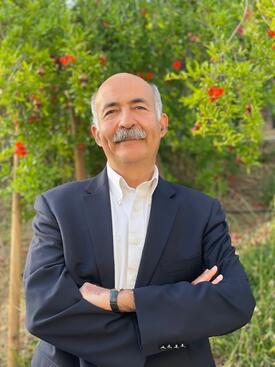Bahram Mobasher, a distinguished professor of observational astronomy at UC Riverside, has received a grant of $425,000 from the National Science Foundation, or NSF, to develop a mentoring partnership with the University of Hawaii. As principal investigator of the three-year grant, Mobasher will serve as director of the California-Hawaii Astrophysics Mentoring Partnership, or CHAMP, that will build on the existing infrastructure and cooperation between the two institutions.
The University of Hawaii has received a similar grant from NSF to develop CHAMP. David B. Sanders, a professor of physics and astronomy at the university’s Institute for Astronomy, is the grant’s co-principal investigator. Sanders will serve as CHAMP’s co-director.
“This grant aims to give underrepresented minority students access to outstanding training in astronomy,” Mobasher said. “Our students will visit the University of Hawaii to get hands-on experience on some of the largest and most powerful telescopes located at Mauna Kea Mountain on the Big Island and learn how to operate them. In turn, students from the University of Hawaii will visit UCR to learn about state-of-the-art data processing techniques in astronomy.”
Each year, four undergraduate and three graduate students at UCR will travel to the University of Hawaii for two months to use ground-based telescopes, such as the Keck, Gemini, and Subaru telescopes, and analyze the data they generate. A similar number of University of Hawaii students will visit UCR to learn machine learning, data science, and artificial intelligence and focus on their application to astronomical data.
After the UCR and University of Hawaii students complete their training, they will be mentored by faculty at their home institutions.
“Our goal is to get students at UCR and the University of Hawaii excited about astronomy and consider the field for their professional careers,” Mobasher said. “There is an emerging need for people with skills in handling big data, and innovative machine learning and data science techniques. Future space missions need support from ground-based facilities, for calibration and follow-up observations. CHAMP students will be trained in the skill sets needed to lead future data-intensive astronomy projects and be introduced to basic techniques in extracting science from data.”

According to Mobasher, very few Latino students take up astronomy as a field of study. The number of Native Hawaiians studying astronomy at universities is near zero in the country. CHAMP will target these students.
“We plan to reach and recruit minority students from high schools and community colleges in Southern California and Hawaii and organize summer courses in astronomy for them, which would help establish a pipeline for such students at both institutions,” he said.
Ultimately, CHAMP will introduce all participating students to advanced observational techniques for using the latest large-format detectors and largest telescopes. The students will also learn the latest visualization techniques and gain skills in handling the kind of big data that future missions will generate.
“We expect such skills will allow the students to compete confidently for data-intensive astronomy positions as well as technical jobs in research and development for which there is high demand and serious lack of a skilled workforce,” Mobasher said.
